

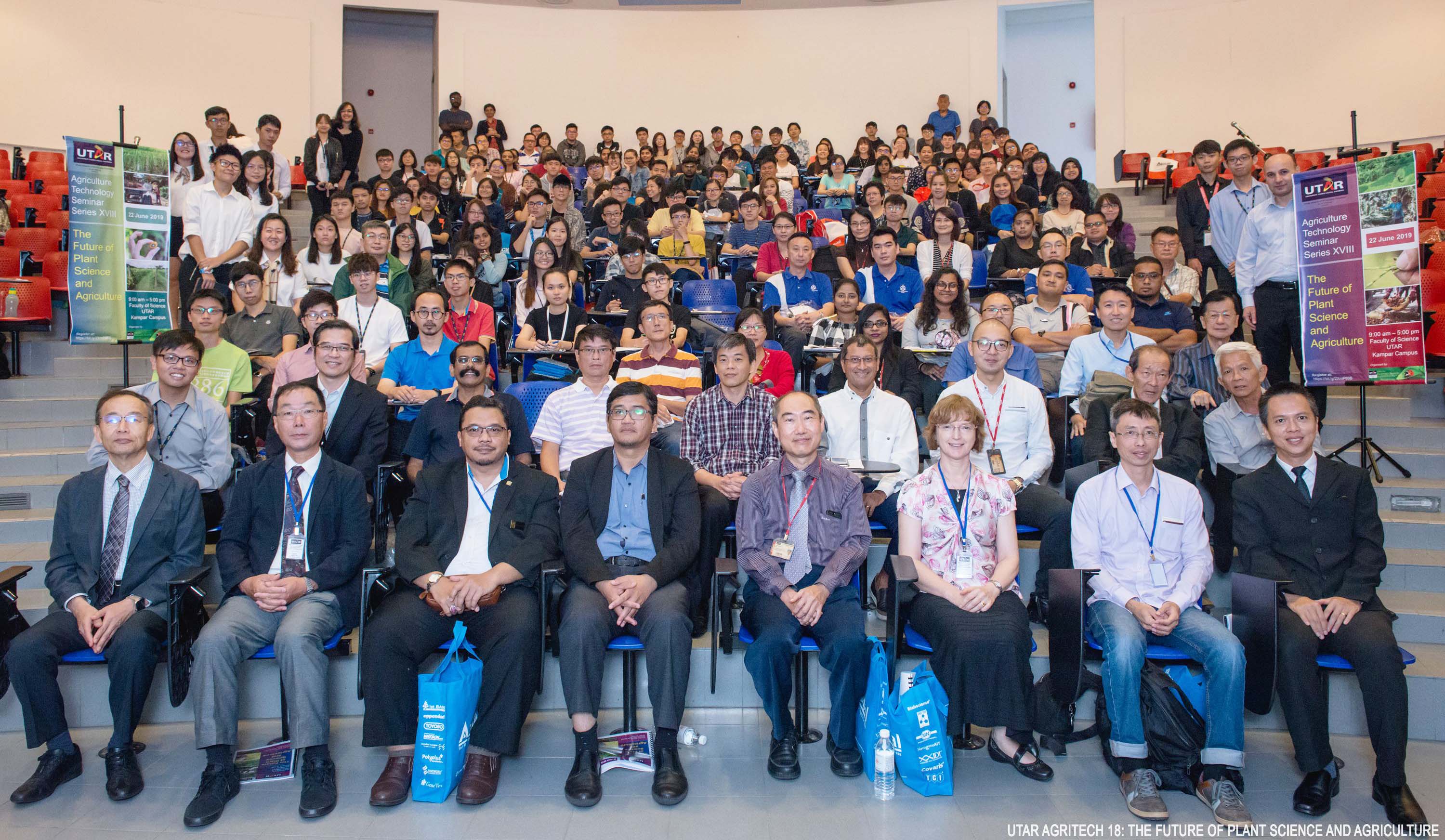
Front row from left: Prof Murata, Prof Sato, Dr Mohamad, Prof Faidz, Dr Lim, Prof Jennifer, Dr Song and Dr Wong
Looking into improving crop production to feed the increasing world population and ensuring food security for all, the 18th Agriculture Technology Seminar Series gathered six esteemed speakers and over 100 participants to discuss the seminar’s theme ‘The Future of Plant Science and Agriculture”. Jointly organised by Centre for Biodiversity Research (CBR), Faculty of Science (FSc) and Institute of Postgraduate Studies and Research (IPSR), the seminar kick-started with a positive note at UTARKampar Campus on 22 June 2019.
The seminar was attended by UTAR Vice President for R&D and Commercialisation Prof Ts Dr Faidz bin Abd Rahman, FSc Dean Assoc Prof Dr Lim Tuck Meng, CBR Chairperson Dr Wong Wey Lim and Organising Chairperson Prof Dr Minoru Murata.
The invited speakers were Barley and Wild Plant Resource Center Head of Institute of Plant Science Resources, Okayama University Prof Dr Kazuhiro Sato; Director of Advanced Biotechnology and Breeding Centre (ABBC) of Malaysian Palm Oil Board (MPOB) Dr Mohamad Arif Abd Manaf; Senior Lecturer from Monash University Malaysia Dr Song Beng Keh; Director of Centre for Research in Biotechnology for Agriculture (CEBAR) of University of Malaya Prof Dr Jennifer Ann Harikrishna; Manager of Group Plantation Advisory Department of Genting Plantations Berhad, Kuala Lumpur Dr Cheng Cong Rong; and CropLife Asia Singapore Executive Director Dr Tan Siang Hee.
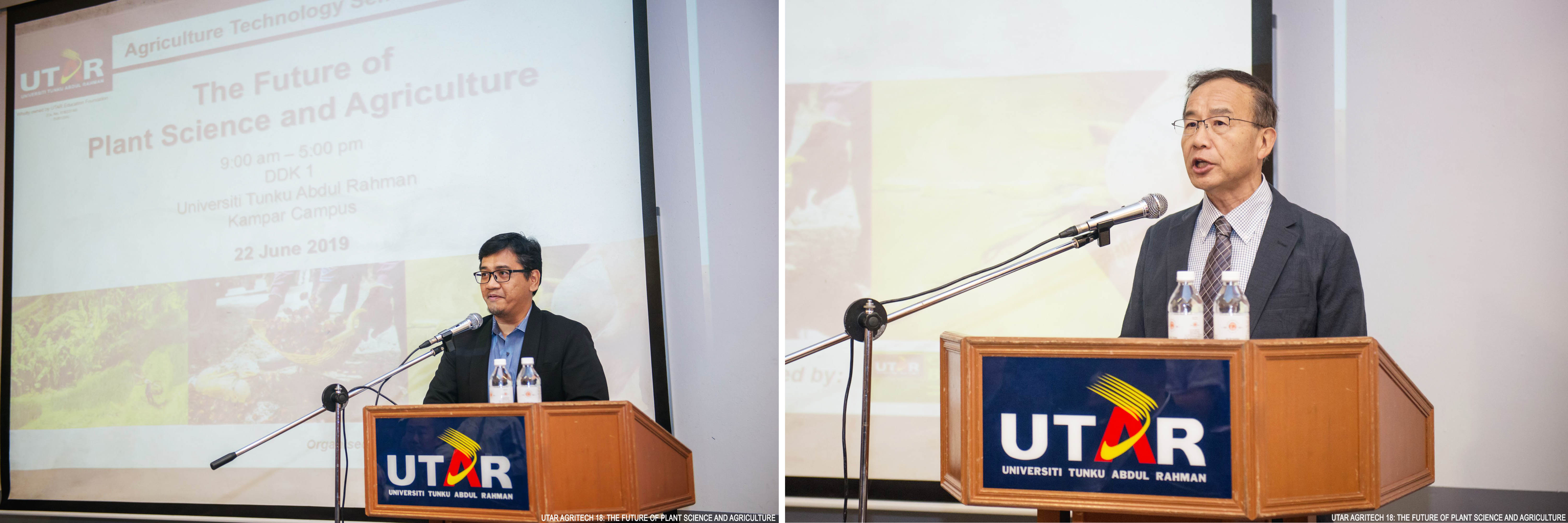
From left: Prof Faidz and Prof Murata delivering their speeches
“Crop production has taken unprecedented prominence today due to the progressive increase of the world population. The United Nations has reported that the human population is expected to increase from the current world population of 7.3 billion to 8.5 billion by 2030, and 9.7 billion by 2050. This makes it necessary for us to improve our ability to supply food to meet the needs of the expanding population. This also means that crop or food production will have to increase by 75% or more, using the same, if not smaller, land area that we presently have for agriculture. Therefore, this seminar will pay special attention to the importance of the roles played by plant science and agriculture in increasing crop production to feed the world in the future,” said Prof Faidz.
He added, “Recent advances in plant science and agriculture research have helped to deepen our understanding on how to grow plants that produce better yields. We have already applied some of these research findings to solve some of the pressing problems in agriculture and they have been crucial in ensuring global crop and food sufficiency. Nevertheless, in our endeavour to increase efficiency and productivity, agriculture today still faces a few challenges in addressing the negative impacts it has on the environment. For instance, its sustainability as well as its effect on climate change and biodiversity. I hope this seminar will not only bring solutions to overcome some of these issues, but also establish collaboration for expanding research in plant science and agriculture.”
“I am glad that we are able to continue organising this seminar, which was started by Prof Dr Peter Ooi Aun Chuan. As we organised this seminar with the aim to provide participants with a platform to share new methods and knowledge in research, we also aim to be able to contribute to the development in plant science and agriculture. With six esteemed speakers present in our midst, we are very fortunate to learn new findings and answers to issues that are faced by consumers and farmers. We will also be learning more about the recent topics in plant science which might be novel in Malaysia,” said Prof Murata.
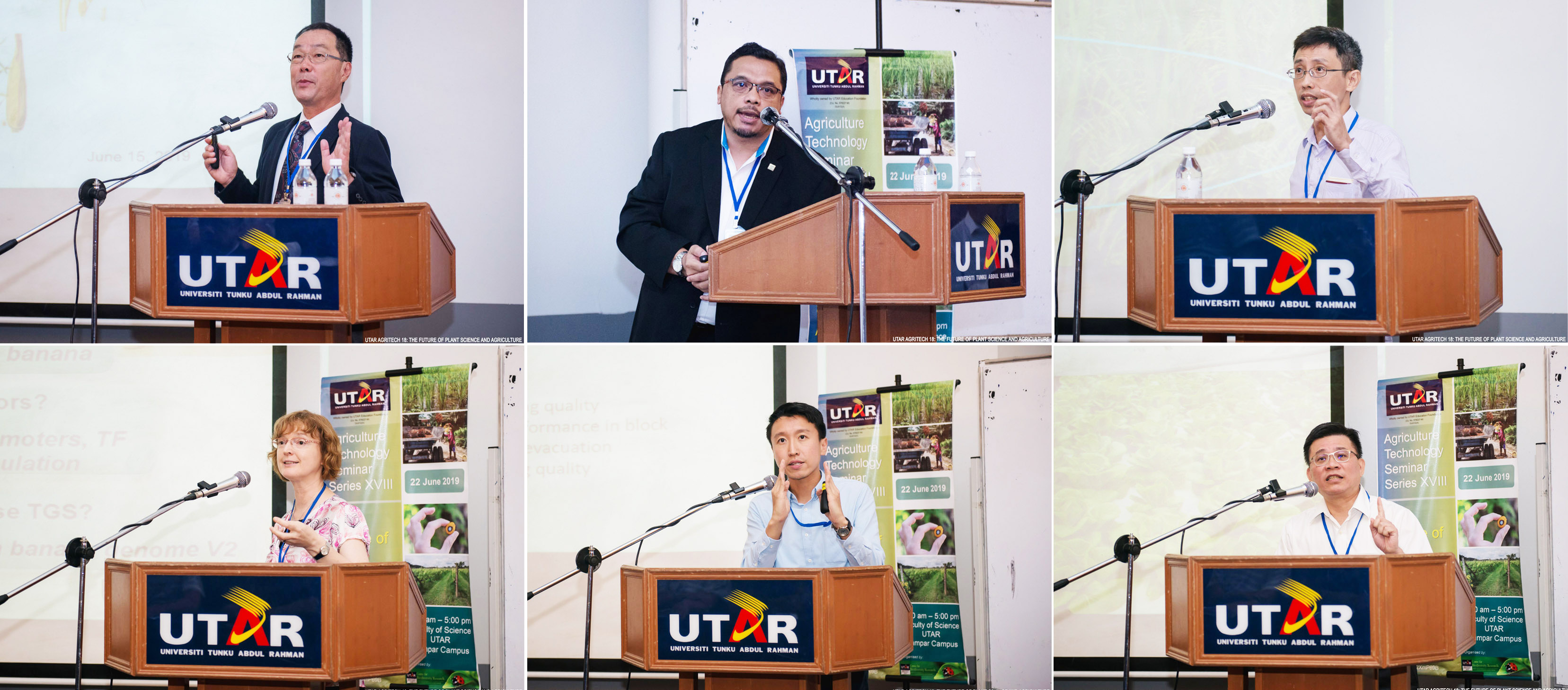
Top row, from left: Prof Sato, Dr Mohamad and Dr Song
Bottom row, from left: Prof Jennifer, Dr Cheng and Dr Tan
The first speaker was Prof Sato, who shared his research titled “Plant Genetic Resources and Our Lives”. His presentation highlighted the importance of plant genetic resources in our lives. He also pointed out that genetic diversity in seed crops can be efficiently stored in the genebanks and that genetic diversity is a key to improve trait for industrial importance. His research has also proven that orthologous genes may control trains in both barley and wheat as demonstrated in seed dormancy.
Dr Mohamad presented his research titled “Oil Palm: Trailblazing the Agribiotech Frontier”. His research provided insights into the application of technology in creating sustainable agriculture. He shared that DNA-centred diagnostics tools have been developed and introduced to boost the productivity of oil palms. Meanwhile, gene editing holds promise in further enhancing palm oil’s versatility in both the food and non-food industry. Participants also learnt about the oil palm industry adopting the use of big data and blockchain technology for establishing a traceable system across the palm oil supply chain, which also reinforces the industry’s commitment towards sustainable practices.
Dr Song, with his research titled “When West Meets East: Genomics and Population Genetics of Weedy Rice” studied the evolutionary mechanism and establishment of the invasive species, weeds or weedy rice. Findings from the research will be useful for advising farmers appropriately in strategies for controlling the spread of weedy rice. The findings also highlight the implications of weedy rice contamination in Southeast Asia and the urgent need for preventive measures for sustainable yield in rice crop.
The presentation by Prof Jennifer, with her research titled “Bananas for A Stressful Future: microRNA-regulated Stress Response”, emphasised the importance of improving understanding of plant stress biology through genomic and transcriptomic analyses, which has also led to the identification of several candidate stress-responsive genes that can be useful for crop improvement. Her team of researchers has also developed mRNA, sRNA and degradome transcriptomes from stress exposed banana roots to identify miRNA-regulated transcripts and transcription factor networks related to drought and salinity stress.
With Dr Cheng sharing from his research titled “Technological Innovations for Oil Palm Plantations during a Time of Weaker CPO Prices”, participants were informed of the agriculture sector moving towards industry 4.0, focusing on digital technologies, such as internet of things (IoT), drone imaging and artificial intelligence (AI). He mentioned that there is still a lacking of technological innovations for automation in oil palm plantations but the adoption of data-driven decision making has improved.
The final presentation by Dr Tan, on his research titled “Feeding Asia in the Age of Scepticism over Science” shed light on the importance of communicating ethically the facts on food safety topics. He mentioned that Asia’s farmers, industry, consumers, civil society, media members, governments and all food value chain stakeholders have a shared responsibility to ensure food safety discussions keep a keen focus on facts and science, rather than fear and sensationalised stories. Though he noted that it was not an easy task, it is critically important to make certain consumer confidence in the safety of food in Asia supported by science.
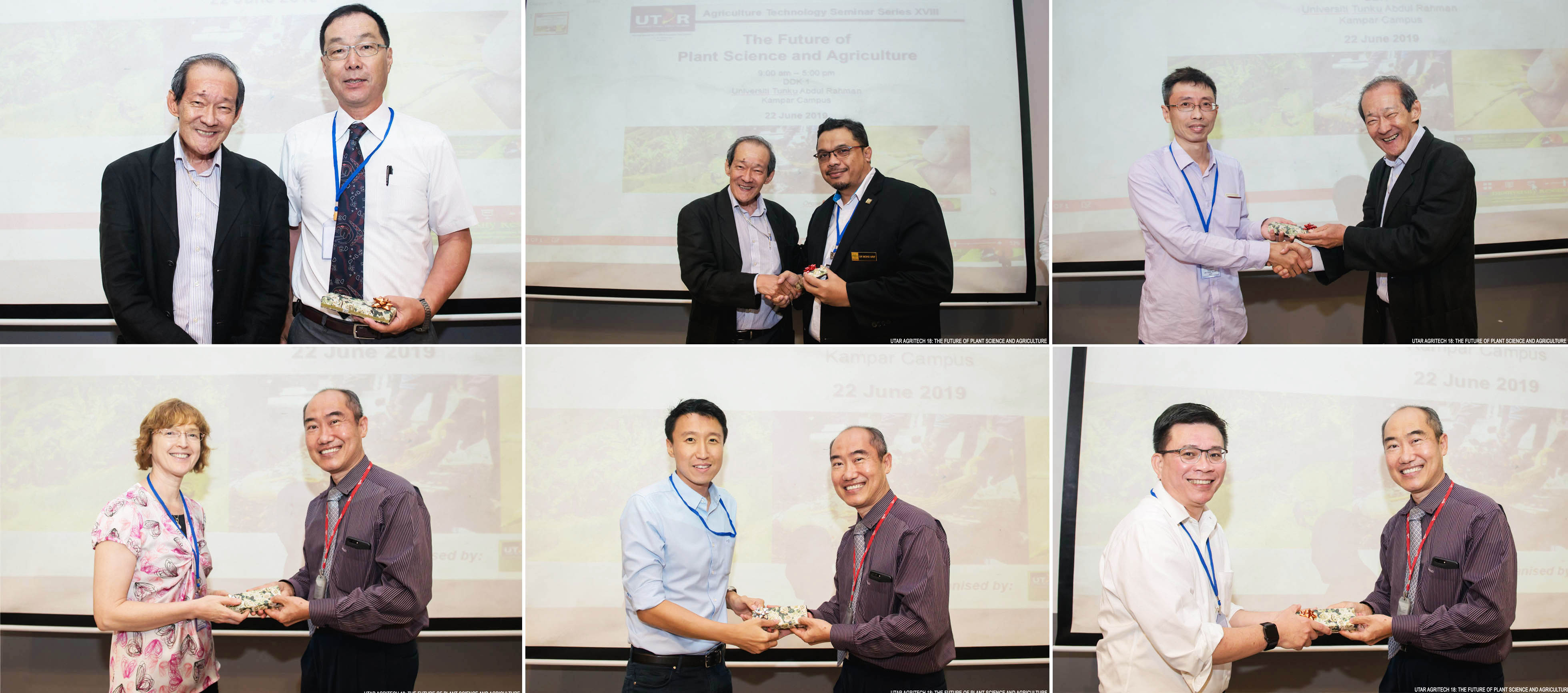
Souvenir presentations to the speakers by Prof Peter Ooi (top) and Dr Lim
The seminar came to an end with a closing speech by Dr Lim. “We started this seminar series back in 2010. In 2011, we started the agricultural science programme and the seminar was a promotion for agricultural activities in Kampar Campus, which was meant to support the agricultural activities of the Northern Region. It supplied much food to the whole of Malaysia and it was important,” said Dr Lim.
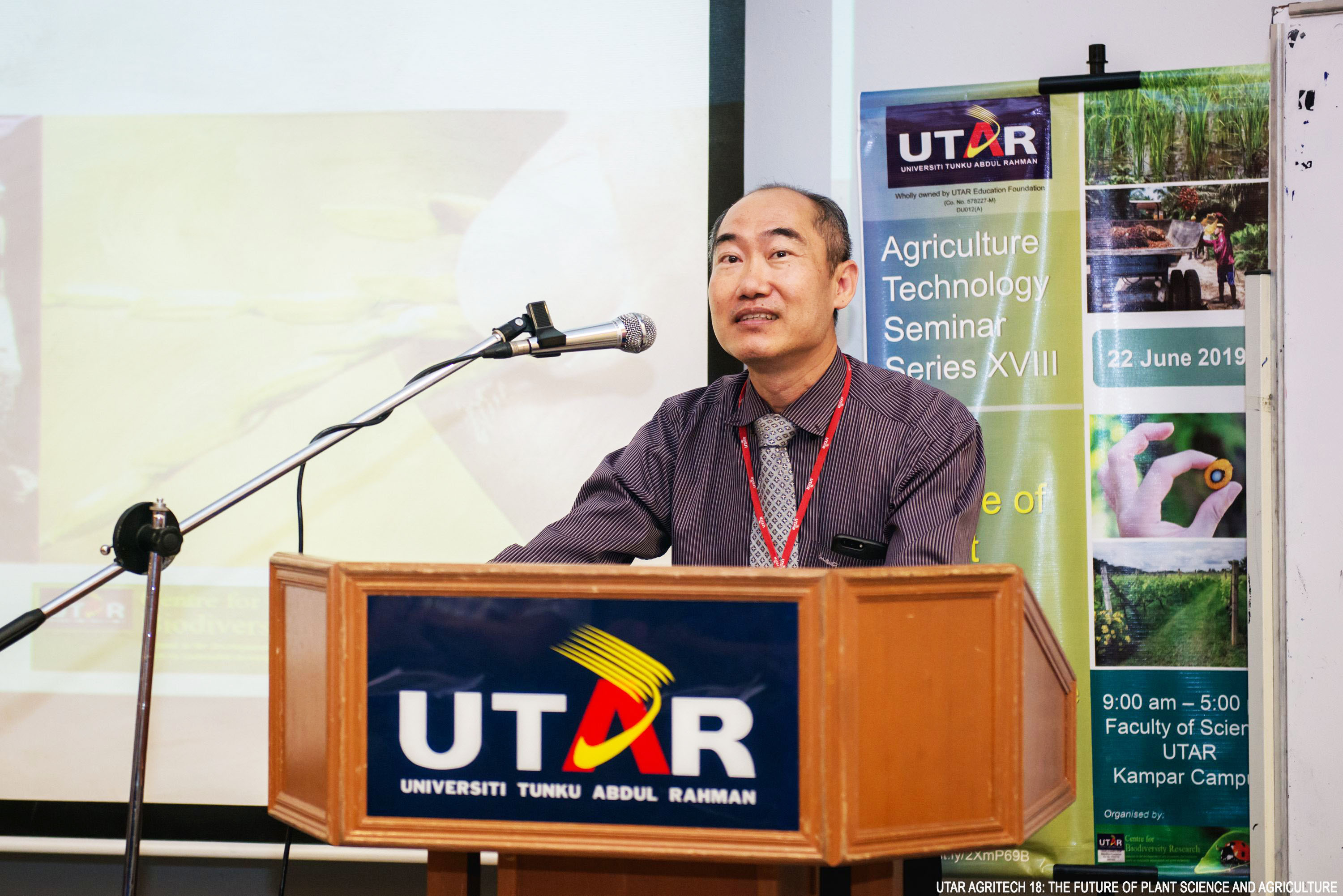
Dr Lim thanking participants and speakers in his closing speech
He also praised the alumni who attended to share their knowledge and experience. He also thanked the supportive participants for their continuous support since the first seminar was organised. The participants were also encouraged to write in their suggestions and recommendations to the faculty to allow more discussion on the suggested topics.
“The presentation on the application of technology was very interesting. We come from the palm oil industry and we have been looking into this for some time now. It was a good seminar because we received much information on how to use technology to improve the palm oil industry, at the same time, we were also made aware of the policies pertaining to technological usage in plantation,” said Ooi Thiam Hue, Kampar Estate Manager of Kuala Lumpur Kepong Berhad.
Another participant also expressed her interest in the use of technology and artificial intelligence in agriculture. “I very much agree with what Dr Cheng spoke because there is a need to move forward. In the past, we have been using conventional agricultural methods, but the opportunities to integrate technology into this field is increasing. I hope we will be able to build mutual collaboration with interested researchers, especially for our startup company. We want to be able to use technology to contribute to the agriculture field,” said Surya Hani binti Abdul Hamid, Managing Director of Solusi UAV Plt. She was accompanied by her colleague, Jamilah binti Basri, Sales and Marketing Director.
Click here to read about the full abstracts and presenters’ profiles.
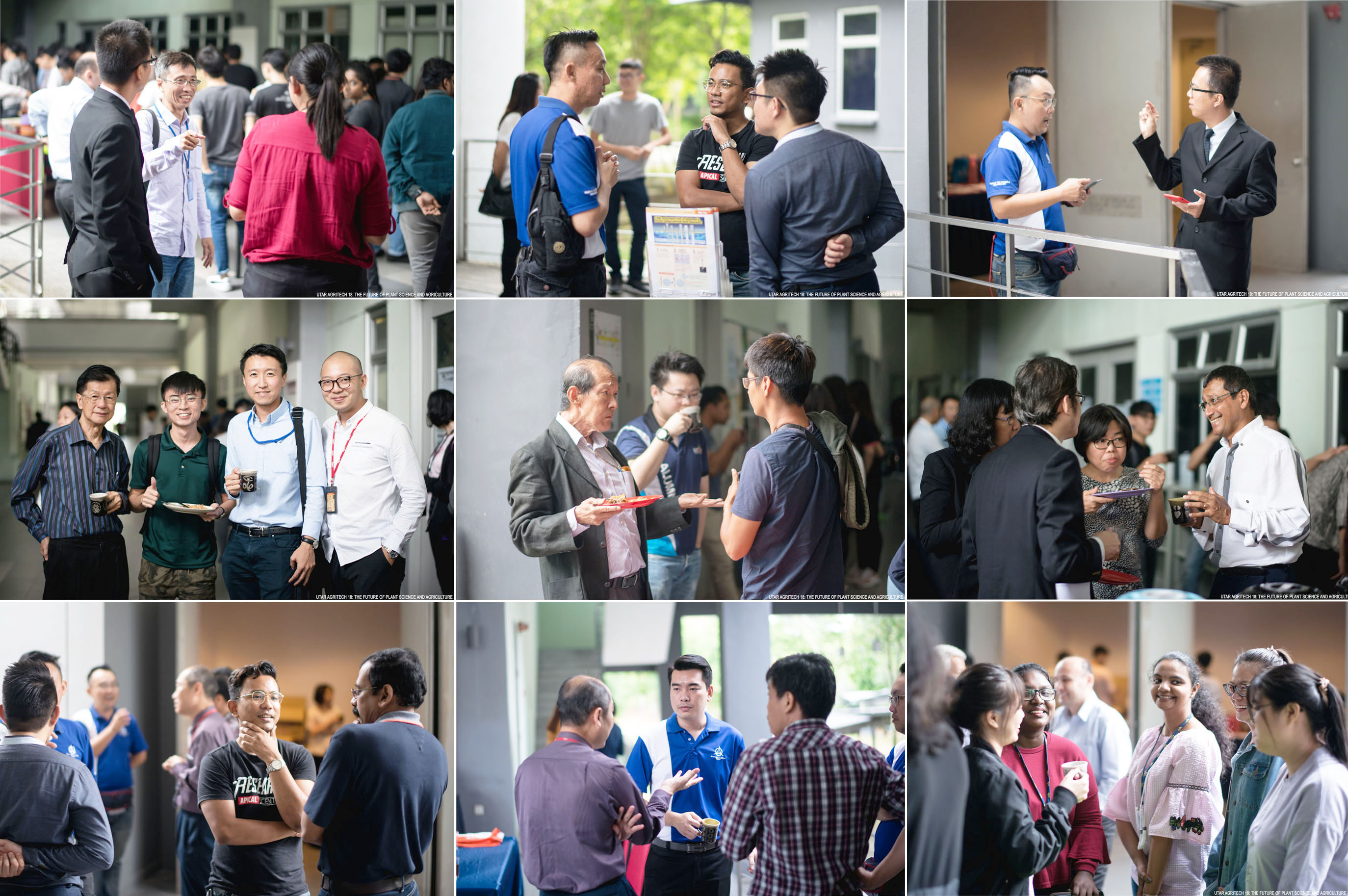
Participants interacting
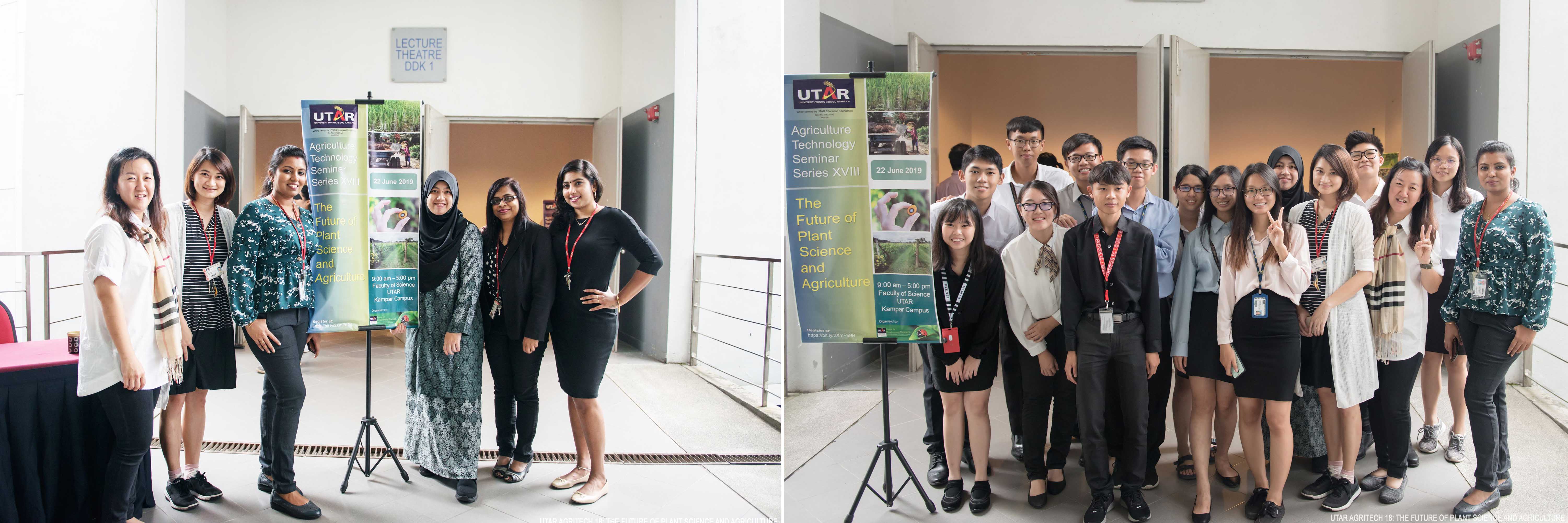
Committee members and student helpers at the end of the event
Read about the previous seminars below:
![]()
© 2019 UNIVERSITI TUNKU ABDUL RAHMAN DU012(A).
Wholly owned by UTAR Education Foundation Co. No. 578227-M LEGAL STATEMENT TERM OF USAGE PRIVACY NOTICE